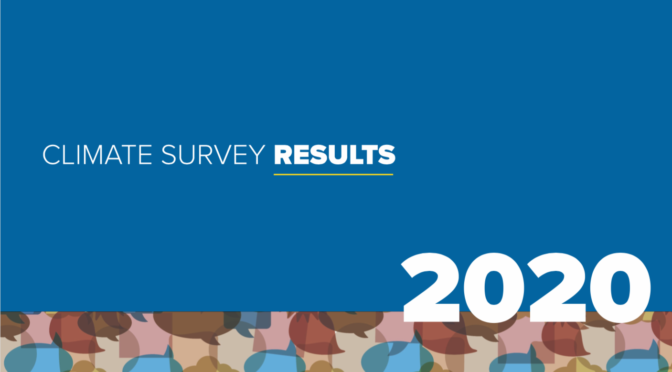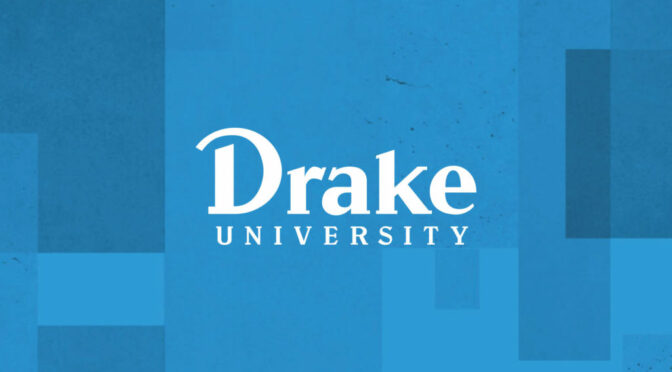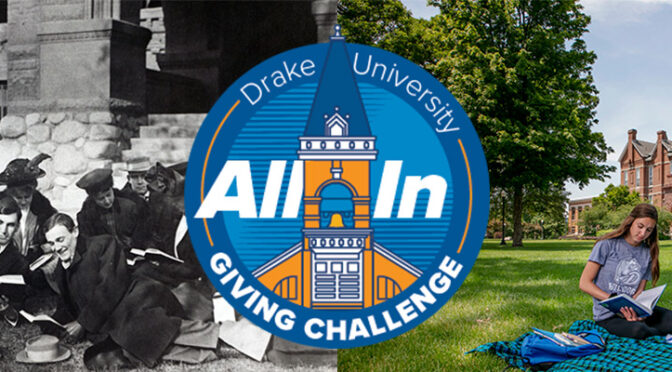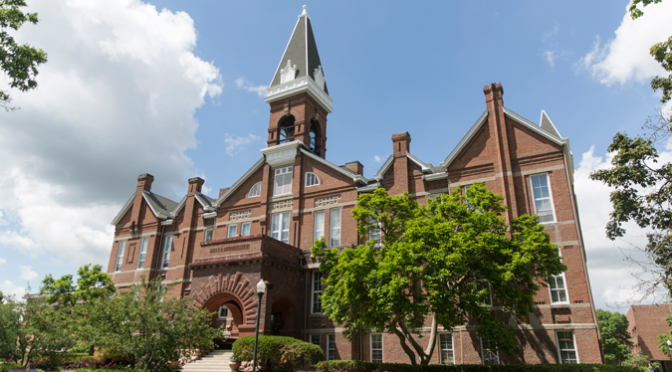The Office of Equity and Inclusion has decided to postpone the Campus Climate Town Halls, originally set for Oct. 8 and 9, to a later date this fall. The Equity and Inclusion team is expecting to receive comparison data from other colleges and universities in the coming weeks. Therefore, the decision was made to hold the town halls after this information has been received. A new date for the town halls will be shared as soon as possible.
Category Archives: Strategic Updates Archive
Voices of Drake: Denisse López, senior, double major, treasurer of LFL
This Q&A is part of the story series Voices of Drake that highlights the diversity, ambition, and passion of the incredible people who make up our campus community. This week’s story is designed to celebrate and shine light on Latinx Heritage Month, Sept. 15–Oct. 15. It spotlights Denisse López, senior, double majoring in international relations and sociology, and treasurer of La Fuerza Latina.

Tell us about yourself?
My name is Denisse López and I am a senior at Drake double majoring in International Relations and Sociology with a minor in Politics. I grew up here in Des Moines and graduated from East High School in 2017. My family immigrated here from a southern, coastal state in Mexico known as Guerrero. I am a first-generation American as well as a first-generation college student.
What was your journey to Drake like? How did you decide to come here?
Drake University was in the backdrop of my life for a very long time. My first bus stop for school was on the corner of 22nd and Carpenter, just down the street from campus. It seemed like an easy decision to be able to stay home while getting an education.
What have been some of the highlights of your Drake experience either in the campus community, in the classroom, in the Drake neighborhood, or in the Des Moines area?
My favorite part of being at Drake is being involved with the multicultural student organizations. Even as someone who has been in Des Moines almost my whole life, it was still very hard adjusting to the classroom setting at Drake. Groups like LFL, CBS, ACSA, NAACP, and many others under the Unity Roundtable have all been safe spaces where I can feel comfortable while on campus. A specific highlight was during Relays Week in 2019. Members of LFL getting ready to paint our square on Painted Street when we found out Rainbow Union didn’t get a square to paint. The consequences of changing our design without approval seemed so minimal in comparison to making sure LGBTQ+ members of the Drake community were represented on such a major part of the campus.
Who have been some of your important mentors during your time at Drake?
Navigating a university setting as a first-generation student has been difficult. One of my biggest struggles has been figuring out not only how to ask for help, but figuring out where to go or who to go to. My academic advisors Mary McCarthy and Nancy Berns have been a huge help during my time at Drake. Professor Berns actually recognized my interest in sociology as an area of study for me before I did—she suggested a minor in sociology a couple years before I decided to take it on as a second major. Aside from being helpful in an academic sense, she has always reached out to make sure I am doing well in other parts of my life as well.
What are your goals after graduation?
After graduation, I will continue to be involved in the Des Moines community. This summer I started Food for Our Fighters which is a community organization centered around supporting human rights. Our main focus this summer was supporting the Black Liberation Movement, but we have also supported movements around immigrant and indigenous communities. I would also love to travel and learn more about different cultures throughout Latin America, but that of course depends on how we continue to handle our current circumstances.
You gave a lecture for La Fuerza Latina entitled “Afrolatinidad and Why It Matters” as part of their National Hispanic Heritage Month programming. How did you get involved with La Fuerza Latina? What has it meant to you in your time at Drake?
La Fuerza Latina has been a safe space for me on campus. I started attending general meetings during my freshman year and was invited to take on the new position of the organization’s Unity Representative last year. I am currently serving as the treasurer for the 2020 executive team. Over the last few years, La Casa Cultural has been a place where I’ve felt I can be more expressive of my identity, it’s like my home on campus.
Will you tell us a little about Afrolatinidad? Why is it important to reflect on Afrolatinidad during National Hispanic Heritage Month?
Afrolatinidad is a cultural identity marker that celebrates being both Black and Latinx. Anti-blackness is what I call a badly kept secret in Latin American culture. No one wants to explicitly talk about it, but it shows itself in how we talk about the texture of our hair or the color of our skin, even in what kind of people your family thinks are appropriate for a partner. A lot people tend to think that Blackness and Latinidad are mutually exclusive and don’t recognize how much of what we celebrate as Latin American culture is rooted in our African ancestry. There are so many people like myself who fall under this intersection of identity. My family comes from a region in Mexico with a huge concentration of Afro-Mexicans. Mexico didn’t even formally recognize its Black citizens until 2015. It’s important reflect on Afrolatinidad, not just during National Latinx Heritage Month, but all the time because our African roots should be celebrated alongside our Hispanic and Indigenous roots, not forgotten and erased as has been the case for a long time.
Register to attend the Campus Climate town halls Oct. 8 & 9
The Office of Equity and Inclusion will host two virtual town halls Oct. 8 & 9 at 12 p.m. to share data from the 2019 Campus Climate Assessment. Faculty, staff, and students are encouraged to attend. Advanced registration is required. Register here.
During the town halls, the Office of Equity and Inclusion will review the survey findings analyzed by the ISU Assessment Team. The presentation will acknowledge faculty, staff, and student successes and challenges, and address how we will use this information to work toward developing a campus community that lives up to its fullest potential.
Following the town halls, several roundtable discussions will be held in November to develop next steps.
The campus climate assessment directly aligns with our commitment to diversity, equity, and inclusion, while acknowledging the role Drake University can play in redressing historic injustices that result in continued marginalization of members of specific groups.
— Erin Lain, Associate Provost, Campus Equity & Inclusion
Campus construction project update
Bulldog Plaza:
Building our Future on the Foundations of Our Past . . . literally.
During our excavation to place the footings for the new granite walls along University Avenue in front of Old Main, we discovered the foundations of a previous building. The existing foundations mirrored nearly the same path needed for our new project, and were proving to be nearly impossible to remove given their size. We verified with our structural engineer, and in the end, chose to embrace the past, and use the abandoned footings as our new base.
Over the next few weeks, the project will really begin to take shape with the completion of the granite wall, sidewalk, and plaza paver installations, including the masonry base construction for our newest bulldog sculpture on campus. Remaining construction items are planned for completion the week of Aug. 24. As the construction activities wrap up, temporary fence will be removed, with site restoration, grading, and landscaping to continue. Funding for this project is made possible through multiple philanthropic gifts.
Hubbell Dining Renovation:
We have had an incredible summer of construction at Hubbell Dining Hall. While students are counting the days until the start of the fall semester, contractors, design teams, and Drake staff are working hard to make that a return to the new, instead of the old. The thousands of planning, design, and construction hours needed to transform Hubbell Dining Center are nearing the finish line. The new finishes, kitchen spaces, and serving stations, are just a part of the improved overall dining experience available for students returning to campus in a couple of weeks.
Our teams have also been working diligently on providing a safe dining experience compliant with other COVID protocols we are using throughout campus. Funding for this multi-million dollar remodel is provided by our dining partners, Sodexo.
— Michelle Huggins, Facilities Planning & Management
Returning to Campus
The latest COVID-19 Update shares information about the University’s gradual return to normal campus operations beginning the week of Aug 3–7. Please read the message in full, including the introduction of the University’s #DrakeTogether Commitments, which are designed to help reduce risk to our community.
A message from Griff on his retirement
Griff posted the following message to his Facebook page June 30, his official date of retirement. His successor, Griff II, will take over full-time mascot duties starting July 1. A changing of the harness ceremony will be planned for this fall to mark the official handoff of responsibilities. More details on the event will be communicated later this summer. In the meantime, share a congratulations message and best wishes for Griff on his Facebook page.
My dear friends,
The time has come for me to sign off and hand over all mascot responsibilities and duties to my successor and best friend, George. There is no doubt in my mind that he is more than ready to assume the title of Griff II and all that comes with it, even though he’s wet behind the ears and awfully naïve. I truly believe he was destined to be your Dog, just as I was. I am excited to kick back and relax while witnessing all the good he’s about to do.
Thank you, from the bottom of my Bulldog heart, for the countless memories—they will stay with me always. And, thank you for all the love you’ve given me every single day I’ve been on the job—I feel larger than life! Being your Dog has been the greatest honor.
And to you, George: Go get ‘em, buddy. I know you’re still a little unsure about all of this, but you are going to be great and I couldn’t be prouder of you. You’ve got this! And if you need anything, I’m pretty sure you know where I live and how to get ahold of me. I’ll be with you every step of the way.
There is no doubt you’re in the best paws going forward, Bulldogs, and I can’t wait to be back on campus this fall for the much anticipated, first ever changing of the harness ceremony! Take care, my friends, and be sure to keep up with George right here. I’m sure he would love to hear from you tomorrow, so you might consider leaving him some words of welcome and encouragement as he starts out.
I am SO proud to be your dog! GO BULLDOGS, always and forever. Griff I, out.
— Griff
All In Giving Challenge success
This week, we celebrated the collective spirit of the Drake community through Drake All In. I’m pleased to share Drake received $437,225 from 1,029 gifts during the annual 24-hour giving challenge.
This total reflects the confidence and generosity of our alumni, faculty and staff, students, and friends. Their gifts will positively impact many areas of campus, including our colleges and schools, Athletics, and initiatives for diversity and inclusion. In these challenging times, I am inspired and grateful to see the Drake community rally around its students and support the life of the University.
All In recognizes the accomplishments, dedication, and resilience of the Bulldog family, and we should all take pride in the outcomes of this event. It’s through your efforts that Drake remains an institution that individuals find worthy of their time, energy, and investment. Thank you to everyone who supported All In through your contributions, advocacy, creativity, and commitment to Drake’s mission.
— John Smith, Vice President for Advancement
Financial aid appeals for loss of income related to COVID-19
The following COVID-19 update was sent to campus June 24 from Ryan Zantingh, director of student financial planning.
As we navigate unprecedented economic upheaval created by the COVID-19 pandemic, I want to make you aware of Drake’s financial aid appeal process that is available for a recent loss of income or other special circumstances. For certain situations, financial aid administrators have the authority to make changes to a student’s FAFSA in order to more accurately reflect a student’s ability to pay for college.
If you have completed the 2020–2021 Free Application for Federal Student Aid (FAFSA) and anticipate a reduction of family income in 2020 (compared to the 2018 income reported on your FAFSA), you may wish to submit Drake’s Special Circumstances Form to report your situation. Staff from the Office of Student Financial Planning will review your appeal and, if appropriate, adjust your FAFSA. This adjustment may result in increased eligibility for need-based student financial aid.
Adequate substantiation is required in order to consider an appeal for special circumstances. Please complete the Special Circumstances Form with as much detail as possible and include supporting documentation when submitting your form.
I recognize that a great amount of uncertainty about the pandemic remains and projecting 2020 income may be difficult. If this is your situation, I encourage you to submit this form later in the summer or during the fall semester when you are better able to provide accurate information. There is not a pressing deadline to submit this form, but understand that billing obligations will continue as scheduled. Accordingly, you should submit your appeal as soon as you have the information needed to do so.
If you have questions or need assistance with this process, please contact the Office of Student Financial Planning at financialaid@drake.edu.
Drake’s Special Circumstances Form for 2020–2021 is available here.
Please visit drake.edu/coronavirus, which houses a repository of campus updates and messages pertaining to the COVID-19 pandemic, and also provides answers to many frequently asked questions.
All In starts today!
Drake University’s seventh annual All In 24 Hour Giving Challenge began today (Tuesday, June 23) at noon and ends tomorrow at noon! We hope you’ll join us in celebrating this important event for Drake.
At at time of immense change and uncertainty, All In is a unique event designed to bring together hundreds of members of the Drake Community to support, share, and celebrate everything that makes Drake exceptional. Last year more than $500,000 was raised for areas all across campus.
You can participate in the event by spreading the word about All In today and tomorrow throughout your networks. Follow and share content on Drake’s Facebook, Instagram, and Twitter pages, plus visit the All In website for highlights.
Thank you for your commitment to Drake and for coming together to help build a brighter tomorrow.
Standing for Justice
The following message was sent from President Martin to the campus community on Monday, June 1.
Dear colleagues and students,
George Floyd died one week ago today, handcuffed and pinned to the ground by Officer Derek Chauvin of the Minneapolis Police Department. The video of the arrest shows Officer Chauvin with his knee on Mr. Floyd’s neck while Mr. Floyd pleads with the officer, telling him that he is in pain and that he cannot breathe, before he calls out for his mother. Officer Chauvin kept his knee on Mr. Floyd’s neck for more than two minutes after Mr. Floyd became non-responsive.
Mr. Floyd was pronounced dead at the Hennepin County Medical Center a little over an hour after he was first approached by Minneapolis police officers. He was forty-six years old. He was a son, a brother, a friend, the father of two daughters, and a grandfather to a three-year-old girl. He died telling Officer Chauvin, “I can’t breathe.” He died saying to Officer Chauvin, “please, please, please.” He died calling out to his deceased mother.
Officer Derek Chauvin has been charged with third-degree murder and second-degree manslaughter, and he and the three other Minneapolis police officers involved in Mr. Floyd’s death have been fired. While it is commendable that these actions have been taken, it remains heartbreaking and infuriating that Mr. Floyd’s pleas were met with such callous disregard by Officer Chauvin and his fellow officers. This is made all the more heartbreaking and infuriating by the fact that Mr. Floyd is not the first Black man to die while telling a police officer, “I can’t breathe.”
We can and we must do better. This is required of every single one of us and every single institution in this country. Justice demands that we all do our part to confront and overcome the legacy of bigotry that motivates an Officer Chauvin to put his knee on Mr. Floyd’s neck and keep it there as Mr. Floyd’s life is extinguished.
This institution and its people – faculty, staff, students, and alumni – have worked and will continue to work to stamp out bigotry and intolerance, to make our campus and our communities welcoming and safe for all. Indeed, we demonstrated our willingness to be in this fight together nearly two years ago with the Paint It Black movement. Drake University is committed to equity and inclusion and we will – through education, scholarship, service, and advocacy – strive to be part of whatever it takes to ensure that the right to life and liberty is not denied to anyone because of the color of her or his skin.
Sincerely,
Marty






